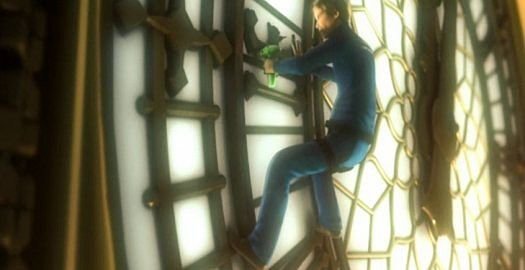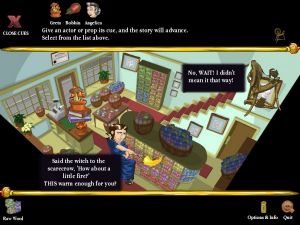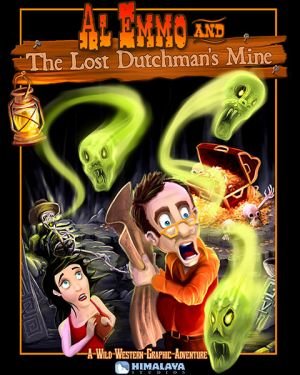Review for 15 Days
Here’s the best thing I can say about 15 Days: it has a really cool opening cinematic. More like a sequence out of an action movie or 24-style TV show than the average adventure game, it uses split screens and smart camera cuts to show a number of high-energy scenes: two men in black scaling London’s Big Ben; a white-haired man in a fancy office collapsing onto his massive desk; a bold swath of paint brushed across a blank canvas; a gloved hand tapping a key into a safe. It’s a set-up that promises a game of heists and chases, of intrigue and adventure.
Better enjoy it, because it’s all downhill from there.
House of Tales, the German studio behind 15 Days, has made a name for themselves with intelligent, dramatic, and at times experimental adventure games, including 2004’s The Moment of Silence and 2007’s Overclocked. On its stylish surface, 15 Days appears to follow suit. The protagonists, a trio of altruistic art thieves, are kind of like Robin Hood meets the Mod Squad. They steal paintings in exchange for big money, then give their earnings to charitable organizations. This has been working well so far, but they’re about to get in over their heads, and it’s the player’s job (in theory) to help get them out.
Cohabitating in a trendy London loft, the confident, clever, and often sarcastic main characters have a complex relationship that at first suggests the developer’s signature style of modern storytelling is back at work. The loft is an urban twentysomething’s paradise, strewn with wine glasses, wall art that includes a Che Guevara poster, and an appropriate amount of clutter for a shared flat. This is where the game begins, as Cathryn (the cute girl of the bunch) stumbles out of her bedroom. Hung over and depressed about her 30th birthday, she starts snarking at her male roommates, Mike and Bernie, with amusingly snappy dialogue. So far, so good. Then the player gains control over Cathryn, and the problems begin.
But wait... before we delve into the issues, let’s get the nuts and bolts out of the way. 15 Days uses 3D graphics with fixed cameras, and all interactions are performed with the mouse. Though Cathryn is the playable character for most of the game, there are brief portions where you control Mike, Bernie, and Jack Stern, an international police officer looking into the trio’s crimes. You can double-click to make the protagonist run or instantly exit a room, and pressing Esc allows you to skip a long string of dialogue or a cutscene. (As far as I could tell, there’s no way to skip individual lines without jumping to the end of the entire exchange.) Click on an item and you’ll get options to look at it or (occasionally) use it; move the cursor to the bottom left of the screen and you’ll have the option to visit the quick travel map or slide open the inventory. This interface is at times more stylish than functional. Often when I tried to select something from my inventory, I jiggled the mouse and accidentally canceled the action instead of performing it. Even so, the game’s controls are fairly straightforward and I didn’t have any major problems with them.
If only that could be said for the rest of the game. So what’s wrong with 15 Days? By far the biggest issue is that there’s almost nothing to do. Occasionally you pocket an item and there are a couple of standalone puzzles, but the vast majority of the game is spent walking from one room to another in a desperate hunt for gameplay. There are some people to talk to--in fact, once the NPCs get going you can’t shut them up--but these dialogues are far from interactive. There’s no choice about what to ask or how to answer a question, no thought required. You typically only get one dialogue icon at a time, and frequently that “option” seems to have been thrown into the conversation just to keep the player from dozing off. Hotspots are few, and those that exist generally come with extremely obvious observations that weren’t worth the effort you put into clicking on them. The game’s heist-themed storyline has a number of potentially exciting scenarios, yet more often than not, the player sits back and watches what happens. No suspense. No drama. No adventure.
Fans of this genre tend to engage in lively debate over the pros and cons of “interactive stories,” the assumption being that in an interactive story you simply click every now and then to make the action progress, and in an adventure game, you do stuff (solve puzzles, use objects, etc.). I usually fall on the interactive story side of this debate. I really don’t mind minimal gameplay if the story is good and the gameplay that exists is well integrated. I’m sure there are those who will say 15 Days is an interactive story, and that’s why it’s a bad game. I disagree. 15 Days is a bad game for far more egregious reasons than its story (interactive or otherwise).
For one thing, it feels conspicuously unfinished--like a beta version, not a game ready for release. Character animations are at a bare minimum. They sit or stand in place while long conversations go on between them. No hand gestures, no pacing around the room, no camera zooms or cuts reminiscent of that exciting opening movie. This isn’t too unusual for an adventure, but in a game with this much talking, it’s pretty obvious. Even worse, 15 Days is also plagued with animation glitches that should have been caught: characters popping from one spot to another, or hovering a few inches over a chair instead of sitting in it, or making a phone call without picking up the phone. Lip sync frequently doesn’t work, giving the impression of very stylish ventriloquists. There are even questionable camera angles that sometimes result in conversations taking place with one of the speakers entirely off screen. During one lengthy dialogue outside a Paris museum, the camera was focused on an extreme close-up of Cathryn’s butt. (I don’t think it was an artistic decision!)
There are more serious bugs as well. 15 Days crashed on me a dozen times on one PC, and at least as often on another test machine, with multiple message board complaints showing I’m not the only one. These crashes were usually random and easy to recover from, but twice I hit show-stoppers that required me to use other players’ saved games in order to proceed. The game also has some awful audio issues, with the volume of voice, music, and effects jumping around from scene to scene. I prefer to play with subtitles turned off, but the audio frequently dipped so low--independently of the audio settings in the game controls--that I had to turn them on just to understand what was happening. One or two issues like this I could forgive, but 15 Days has so many that it seems clear the production team worked on it just long enough to make it playable, and no longer. It is playable, but we deserve better.
And then there’s the story. I feel a little bad griping about this, because I do admire the developers’ attempts to bring this contemporary cinematic premise into an adventure game. In the early scenes we learn that to further their humanitarian goals, the thieving trio has gone into business swapping valuable paintings with copies, selling the originals, and donating their earnings to charity. Then a mysterious new client asks the group to steal a painting from the London Modern in exchange for a sum higher than they’ve ever earned before. Cathryn and the boys jump at the opportunity, not realizing until too late that they’ve become entangled in a conspiracy that runs much deeper than a little altruistic art theft. They’ll travel from London to Paris to an island in the South Pacific before they’ll find their way back out, putting their own freedom at risk and the life of a close friend on the line.
All in all, it’s a decent idea and the main characters are fairly well rounded. But the story is so full of holes, I spent most of my playing time either scratching my head over a logical leap or trying not to laugh at the transparent plot points. It’s both not obvious enough and too obvious at the same time. One example: remember those guys scaling Big Ben? The culprits were Mike and Bernie, stealing digits off the clock face to give to Cathryn as a birthday present. But the numbers are never presented to her, and the reasoning behind why she’d even want them is never explained. The clock digits appear to be sitting on the loft’s central table, in plain view, yet no one ever comments on them and you can’t click on them or do anything with them. It’s as if an entirely separate story thread was meticulously set up, then hastily dropped. Unfortunately this is a common theme. The game is constantly teasing puzzle set-ups and plot hints that end up going nowhere.
Likewise, major story points come flying out of the blue in a desperate attempt to tie everything together. American police officer Jack Stern, who arrives in London to investigate the (apparently) unrelated death of a British government official, abruptly drops everything to tail the thieves to Paris, for reasons that are never clearly explained. A nightclub that the group ends up at just happens to be owned by someone who ties into the overarching plot and unloads his entire, seemingly random life story on them. It’s an obvious attempt to impart Very Important Information on the player, but it doesn't suit the context. In fact, the whole story is infused with a strong sense of puppet strings being pulled by invisible forces—as if a much larger story was planned, then scaled way back and clumsily pieced together into this plot that, even if you’re paying attention, makes very little sense.
I did enjoy the handful of mini-games related to computer geek Mike’s hacking attempts—some of the game’s rare moments of interactivity. (They’re referred to in the UI as “mindgames.” I’m not sure if that’s a localization mistake or an intentional characterization.) These brief sequences, which involve tasks such as synchronizing signal waves and lining up laser beams protecting a painting to allow Cathryn to shimmy past them, will likely appeal to puzzle fans, as will a maze Cathryn must navigate in the Paris catacombs with the help of a map and compass. With the exception of the maze, these challenges can be skipped after a while if you can’t figure them out, but I solved them fairly easily through trial and error. Another prominent type of “puzzle” involves using an in-game computer to check email and do simple browser searches. These activities make sense for the story, but I wouldn’t call them fun any more than typing someone’s name into Google and clicking “I Feel Lucky” is fun. (Hey, your mileage may vary!)
The rest of the gameplay is wholly uninspiring. Each character has an inventory and you will pick up a few items, but even this feels sloppy. At one point, Mike asks Cathryn to “find” a USB stick that’s sitting in plain sight right in front of them. So you get to pick it and hand it to him. (Yes, that’s a puzzle!) Yet other sequences that could easily have been left to the player to figure out instead proceed automatically, as if the game is going out of its way to keep you from doing any heavy lifting. Annoyingly, items frequently show up in your inventory right when you happen to need them. Example: there’s a flashlight sitting prominently on Cathryn’s desk at the beginning of the game. Try to select it and she helpfully observes, “A torch.” You can’t pick it up, but later in the game, just before she enters a dark area, it has magically appeared in her pocket. I’m not suggesting that picking up a flashlight for later use is compelling gameplay, but it’s something I expect to do in an adventure game. If she’s going to need it later, why not give the player the satisfaction?
Despite all of these issues, 15 Days does have some nice bones—or maybe they’re glimmers of what could have been. The 3D artwork is stylish and well rendered, the characters fairly detailed (although some facial expressions beyond “staring into space” would have been nice), and the suspenseful-yet-playful soundtrack could have come straight out of an Ocean’s Eleven movie. Though they’re all eerily empty, the game does take the player to some interesting urban locations that include classical and modern art museums, the top of the London Eye, the skull-lined catacombs beneath the Paris streets, and a tropical island ravaged by tyranny. There are maybe a dozen visually compelling cinematics throughout, though none quite as exciting as the opening movie. And I was especially impressed by the voice acting; Cathryn and Mike in particular give great performances. The script’s translation into English, peppered with slang authentic for the characters, was also well done.
But none of these positives can redeem an otherwise awful game. (A short one, too—only about seven hours of “play” time for me, and that included backtracking due to the crashes.) If, like me, you’re a fan of House of Tales’ previous work, then you’re probably wondering why 15 Days is nowhere close to the quality we’ve come to expect of the studio. A corporate buy-out, a noticeably short development schedule, and subsequent reports of House of Tales’ founding members leaving the company would certainly seem to have something to do with it. In light of this troubled production history, it’s not entirely surprising that 15 Days smacks of a game that was slapped together and rushed to market. That's no excuse, however, as the game never should have been released in this state.
Ironically, after the closing credits capped off a completely nonsensical ending, 15 Days launched back into its gripping opening movie. Still exciting. Still a great set-up. But as the view shifted to the London flat where Cathryn, hung over, was just stumbling out of her room, I wished I could tell her to turn around. Girlfriend, some days it’s better to stay in bed.































